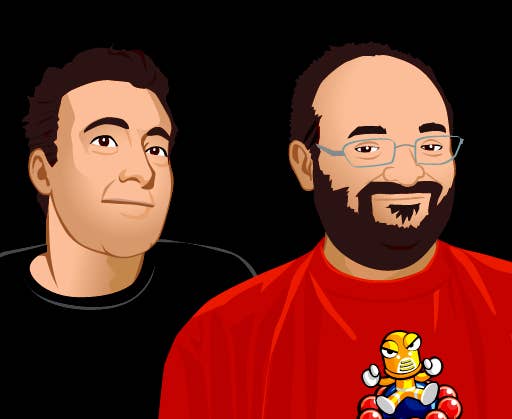Going Coastal
Ahead of the Develop Conference, Dan Pearson takes a look at what makes Brighton a games industry hub
Strange Flavour
Strange Flavour moved down to a village near Brighton from its original base in Newcastle last year. Primarily because most of the industry people they know are in or around Brighton, but also because their office was in a flood plain and they got fed up of wading to the shops.
A small, UK based games developer, run by two brothers, Aaron and Adam Fothergill, Strange Flavour have won an Apple Design Award for one of their Mac games, written experimental games for the XBox 360 for Microsoft and are currently writing best selling iPhone games such as Flick Fishing and SlotZ Racer for their publishing partners Freeverse (now owned by ngMoco/DeNA) in the US.
Aaron Fothergill:Brighton was recommended to us by a lot of our non games industry artist/musician friends as well as those we knew in the industry down here, so after a couple of visits it was the obvious place for us to move to. We didn't end up in Brighton itself, but in one of the villages nearby (we like our peace and quiet, with optional excitement)

How can the UK best apply its pool of talent to a successful games industry?
Write games! It sounds simple, but there are enough talented people out there to create all sorts of new and interesting games but don't because they either can't see themselves writing a whole game or only have part of the skills needed and need to team up with someone with complementary skills.
Writing the first game is always the hardest, and games competitions such as the uDevGames competition running at the moment are great ways for coders, designers, artists and musicians to meet up, team up and write something.
Publishing is probably the easiest it'll ever be nowadays. The App Store isn't a guarantee of success, but a well written game and some good publicity help reduce the lottery effect a bit.
The App Store isn't a guarantee of success, but a well written game and some good publicity help reduce the lottery effect a bit.
Aaron Fothergill, Strange Flavour
What's currently the biggest barrier/threat to that success?
I'd say the cost of living mostly. For a one man team it's the direct financial risk you have of earning enough from one game while writing the next to afford the rent and for larger teams that same cost impacts the size of the wages your people need to be happy and productive.
The lower you can get those overheads, the more risks you can take with your creativity. Tax breaks can help that for the bigger companies and get us on an even playing field with countries that do the same, but simply making life a bit less expensive and easier for everyone would do much the same.
Fat Pebble
Fat Pebble is an independent Brighton developer focused on creating polished, innovative and fun games for all the major smartphone platforms. Formed by Michael Movel - whose 13 year career has seen him making games with the likes of Probe Entertainment, Novalogic, Blitz, Climax Brighton, Lionhead and Zoë Mode - Fat Pebble are a young and enthusiastic company looking for adventure! With four titles already published or in development and more on the horizon, they're ready to take it to the next level and are about to ramp up several of their own projects.
Michael Movel: "I've lived in quite a few different places in my increasingly ageing life and I can safely say there's nowhere in the UK I'd rather be than in Brighton. I've been here on and off (mostly on) for the past 11 or 12 years, and I've always come back. It's got it all really - the sea, the countryside, the city life, the pubs, the parties, the festivals and pretty much everyone here is chilled out and friendly. Except for some of the seagulls, but you learn to cope.
As they close or shed jobs, you always get an explosion of new companies with bundles of enthusiasm looking to innovate.
Michael Movel, Fat Pebble
"During that time it's always been a hive of creative activity of one sort or another, and the appearance of so many new games start-ups is really making it feel like it's the place to be. Exciting times!"
How can the UK best apply its pool of talent to a successful games industry?
"The UK has always had lots of talented individuals in this industry - sometimes they go and work abroad and disappear from these shores for a while, but they're always there and we always seem to nurture new talent as well. I think we should be proud of our record in that regard.
On top of that, we're currently in a period ripe for new start-ups to thrive - on the one hand, creative games made by small teams are all the rage, and coupled with that you have several of the larger companies struggling to cope with the recession and the change in the market. As they close or shed jobs, you always get an explosion of new companies with bundles of enthusiasm looking to innovate. It's like the perfect storm for the creation of small indie developers. I think the result of that will be a) our best developers staying in this country to live the dream of running and working for small, funky companies and making their own decisions and b) bucket loads of innovation and enthusiasm. I'm confident that will lead to an increasingly successful UK industry."
What's currently the biggest barrier/threat to that success?

"The biggest threat is having a negative attitude - either as an individual, a company or as an industry as a whole. Personally I think things have never looked so good. That might seem a bit of a harsh thing to say in an environment where people are losing their jobs - and believe me I've been there myself, so I know it's not nice. But when the dust has settled, I'm sure people will see that there's a whole smorgasbord of tasty opportunities out there to produce successful and creative games. There's a fantastic chance right now for people to get back the passion for making games that might have been lost working long hours for the larger companies on projects that they had very little say over.
"In short, there are more people than ever before buying games, the costs to make a certain kind of game are low and it's never been easier to get those games to the audience.
"However it's easy to look at all the obstacles and difficulties that we face and then start to spread the doom and gloom of an industry in decline. If we do there's a danger that it'll become a self-fulfilling prophesy and our passion and innovation ebbs away. We've got a great chance to bring the fun and creativity back to games, and that will lead to success."








